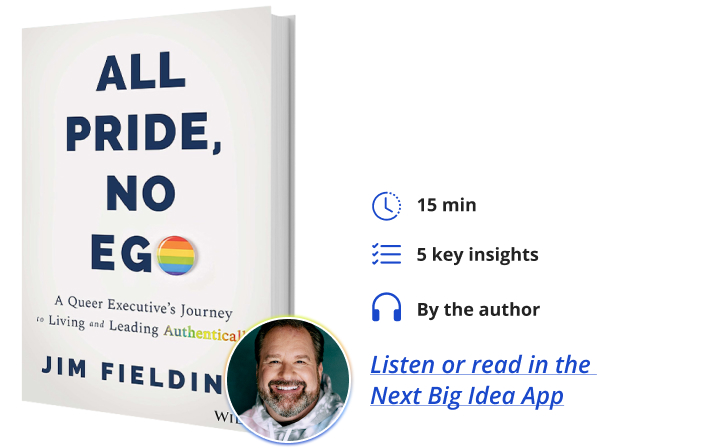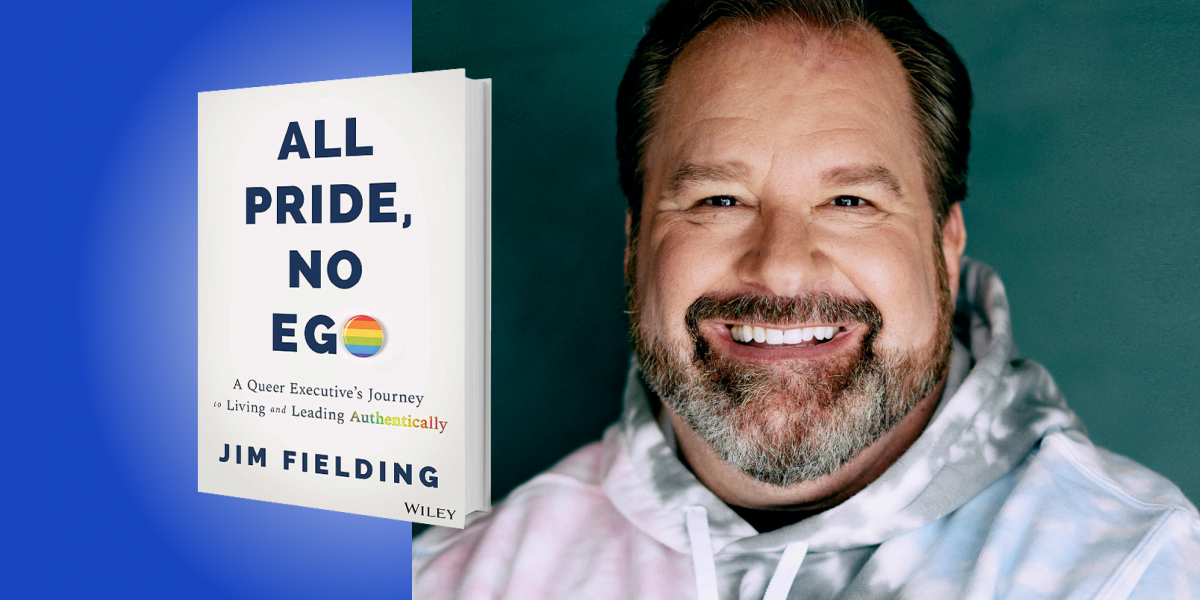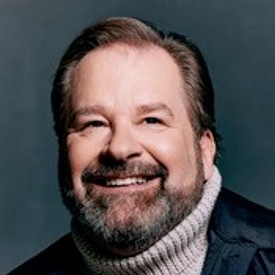Jim Fielding, an executive with over 30 years of experience, has led some of the world’s most beloved media and retail brands, including The Gap, Disney, Claire’s, Dreamworks, and 20th Century Fox. He is an active angel investor, start-up advisor, and philanthropist. He currently serves on the Board of Directors for the Indiana University Foundation and has served on the boards of Make-A-Wish, GLSEN, and the Kidspace Children’s Museum in California.
Below, Jim shares five key insights from his new book, All Pride, No Ego: A Queer Executive’s Journey to Living and Leading Authentically. Listen to the audio version—read by Jim himself—in the Next Big Idea App.

1. Control the controllable, but leave space for the possible.
This leadership and management philosophy, and possibly even personal philosophy, has been forged in my over 35-plus years working in the retail, media, and entertainment industries. In the first 30 years of my career, it was simply, “control the controllable.” Ask anyone who has worked for me, or with me, and they will tell you that I say “control the controllable” a lot. In fact, I have been recognized, rewarded, and promoted for being a Type A control freak: an anal retentive who tried to project manage and control everything.
This meant that almost 100 percent of my personal and professional life was scheduled. I would attempt to deliver on time, on budget, overpromise, and under-deliver on any piece of work that I presented to the leadership team. Later in my career, I realized that I was running down my batteries and having physical issues like not sleeping and dealing with stress. I was curtailing the creativity of my teams by being so controlling.
This is where the second part of the statement, “leave space for the possible” comes into play. I now embrace spontaneity, embrace the happenstance, and find wonder and magic in those unscheduled, unplanned moments. In fact, I think some of my best creative ideas and inspiration came from these unscheduled periods and spontaneous moments. Now I live by an 80/20 rule: 20 percent of my time I use for free time. I go to the gym, meditate, read, sit and listen to nature, color in a book, or do yoga; I basically do nothing. It’s time when I’m just being, and not working. I encourage others to control what they can control, because there are a lot of things in your life you can control. Then I encourage them to understand what you can’t control, and have the wisdom to know the difference. This is where you leave that space for the possible, because there is beauty, magic, and creativity in those moments.
2. Be a lifelong learner and stay constantly curious.
I was blessed to be born into a family of voracious readers. We read books, magazines, and newspapers; in fact, our dinner table conversation included current events, what we were currently reading as well as stories about our day. I am grateful I was raised like this—my first gifts were books, including Dr. Seuss. As a young reader, I loved the Hardy Boys Mysteries, Agatha Christie, and Nancy Drew. I loved the escape of reading and to this day, I read books for pleasure at some point every day.
“To stay successful, current, and relevant, you have to stay educated.”
As a leader, you have got to stay constantly curious and be consistently learning. The pace of change in our industry—technology, competition, geopolitics, and consumers—forces you, as a leader, to stay on top of these changes. You must interpret new developments, new technologies, and new introductions in the marketplace for your own business and for your own team. To stay successful, current, and relevant, you have to stay educated. To do this, you need to access reading, learning, and educational opportunities wherever you can.
3. Learning is entitled.
The phrase “don’t ever let anyone dim your light” really resonates with me. Your light is something that you have control over; it’s your inner inspiration, what gives you pleasure, what drives you, your passion or desires. We all have the ability to turn up or turn down that light depending on the situations in our personal and professional lives.
However, we must not let other people control that switch. I learned this from an early age when I was just a child being perceived as gay or effeminate—different. I let bullies verbally and physically stop me from doing things that I loved. When I was in elementary school, I was in the school choir and performed in school plays; this passion followed me into middle school and through to high school. I loved performing and I loved being on the stage, but every time I got involved in a performance or a choir show, I would deal with verbal and physical harassment and bullying. In the end, it just got tiring, so I chose to avoid those feelings rather than feeding my love of performing.
Later in my life, through work with an executive coach, I realized that because of those insecurities as a child, even though I was a successful gay executive, I still allowed people to bully me in a professional environment. It could be in meetings, with the board of directors, or in interactions with my boss; I had a tendency to let other people control my flame. When that flame, or light, was controlled by someone else, I would then start to become very frustrated, angry, and bitter, I would start to shut down. By working with my coach, I learned that I had to own my light, to control that switch. That is my message to everybody: to be your best, you have to bring all of you to the situations in your personal and professional life. You need to control that switch, that temperature gauge, that light. Don’t ever give that control away to anyone else, whether it’s an individual, a company or a coworker. Control your light.
4. There’s not just one definition of family.
There are many different kinds of families that are important to me personally and professionally. I have been blessed with a very strong biological family. I have a great relationship with my sister, my mom, my dad, who unfortunately has passed away, and my extended family. I work hard on nurturing and cherishing those relationships and I am grateful for my birth family.
It is a sad fact, however, that in the LGBTQIA+ community, many people do not have a strong relationship with their biological family simply because they decided to live their authentic truth. By “coming out,” they sometimes have to sever ties or severely impair relations with their natural family. I think that’s where the concept of chosen family or found family steps in. This is the group of people with whom you have nurtured relationships for years, whether you met them at work, through school, or through volunteer work. These are the people who are your ride-or-die posse—your truth-tellers. These are the people who will not take any of your B.S., but will love you completely, 100 percent unconditionally, and love you for being yourself. Not for being the person you are at work, or volunteering, or in your personal life, but for you. You know instinctively who these people are, and you have built a lifelong history and trust and respectful relationship with them.
“We spend more time at work than we do with our natural family or our chosen family.”
We often throw around the term “work wife” or “work husband”, and it’s kind of a throwaway term, but in reality, we spend more time at work than we do with our natural family or our chosen family. I have found over time the value of having familial-like bonds and familial-like trust and respect with certain groups of people. I am not saying this means that you go out for drinks every day at happy hour, or form these little family teams that cut other people in your group out. I am saying that I have been successful in my career by nurturing long-term relationships with a very diverse set of individuals who have a diverse set of skills. When I mix them with my own skill set, we create pretty magical experiences and magical business success.
When I joined 20th Century Fox, one of the things that I acquired as I became president of consumer products and experiences was my ability to hire a team. The group I was inheriting had a lot of open positions, so I hired five senior vice presidents one week after my arrival was announced. Of the five senior vice presidents, four had worked with me before and had chosen to come with me on this adventure, and the fifth had met me when they were consulting. What we were able to do in those first 12 months at Fox, where we basically turned a business around and created a new culture, was a direct result of having a preexisting relationship. We had a kind of communication shorthand. We understood each other’s strengths, development, and opportunities, and we were able to play off each other effectively. I think leadership is about managing diversity, and the work family in that example was the perfect mix of diversity, equity, and inclusion. All these very different people with different skill sets, strengths, and developmental opportunities pulled everything together. By doing so, we were able to create a really successful business plan and performance culture. We brought passion, drive, and goal alignment, and we brought fun.
5. Selfish is not a bad word.
I was raised in the Midwest by a very classic blue-collar Midwestern family. My dad was a fireman and my mom was a stay-at-home mom, having retired from being an X-ray technician when I was born. I was raised in a house where selfishness was a very bad word. Selfish meant you weren’t sharing toys or your books or you were being mean to your little sister. For us, that usually resulted in a timeout in the corner staring at a wall that could range anywhere from 15 to 30 minutes. It was burnt into me that selfish was a bad word.
However, thanks to my executive coach, I was able to understand that selfish actually means self-care. I think about it every time I am on a plane and they make that safety announcement, “In the event of an emergency, if the oxygen masks drop from the ceiling, take care of yourself first before you take care of anyone else on the plane.” To me, this is exactly what self-care is. I have to take care of my needs physically, mentally, and emotionally, in order to be a more effective leader.
To listen to the audio version read by author Jim Fielding, download the Next Big Idea App today:































